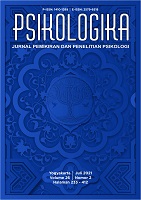Main Article Content
Abstract
Every individual always faces problems, as well as undergraduate students. The problems are usually related to academic and non-academic issues which require the ability to manage and control themselves, so they are not overwhelmed by these problems. Father attachment can help undergraduate students in overcoming various kinds of problems. This study aims to examine the dynamics of these undergraduate students that focus on the relationship between fatherhood attachment and self-control in which subjective well-being (SWB) and psychological well-being (PWB) mediate among students in Yogyakarta. The subjects of this study were undergraduate students who lived in Yogyakarta (N = 245). This study uses five scales, two scales for the subjective well-being variable, one for the psychological well-being variable, one for the self-control variable and one for the fatherhood attachment variable. The scales used include (a) Satisfaction with Life Scale created by Diener et al (1985); (b) Positive and Negative Affect Scales by Watson et al (1988); (c) Ryff's Psychological Well-Being Scale developed by Ryff (1989); (d) Self-Control Scale from Tangney et al (2004); and (e) The fatherhood attachment scale developed by Armsden & Greenberg (1987). The data were then analyzed using mediation analysis techniques through the JASP application. The results showed that fatherhood attachment did not have a direct effect on self-control, but subjective well-being and psychological well-being could act as mediators of the relationship between fatherhood attachment and self-control.
Article Details
Authors who publish with this journal agree to the following terms:
- Authors retain copyright and grant the journal right of first publication with the work simultaneously licensed under a Creative Commons Attribution-ShareAlike 4.0 International License that allows others to share the work with an acknowledgment of the work's authorship and initial publication in this journal.
- Authors are able to enter into separate, additional contractual arrangements for the non-exclusive distribution of the journal's published version of the work (e.g., post it to an institutional repository or publish it in a book), with an acknowledgment of its initial publication in this journal.
- Authors are permitted and encouraged to post their work online (e.g., in institutional repositories or on their website) prior to and during the submission process, as it can lead to productive exchanges, as well as earlier and greater citation of published work (See The Effect of Open Access).




